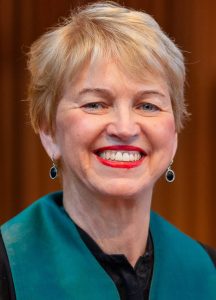My life, like so many others, is a journey of seemingly unrelated worlds merging in joyous, messy, difficult, lovely ways that defy easy explanations.
My experience in the arena of professional clergy intersects with the domestic sphere as a wife and mother and grandmother.
These worlds may seem unrelated at first, but my life and career are a testimony to the direct opposite: Every part is related to every other part.

Donna Whitehead
From growing up in a small town in Louisiana to becoming one of the first female ordained ministers in the United Methodist Church in North Texas, my journey reflects a changing world for women in ministry and the men who worked with us.
In the late 1960s, in the midst of groundbreaking social movements, I had an epiphany of my own. I was a wife and mother who, by all familial and societal expectations, should have felt fulfilled. I had everything, or so it seemed — a husband with a great job, the suburban home I dreamed of and a family that was Hallmark-card-perfect.
Yet, I wasn’t fulfilled. A deep itch in my soul begged to be scratched.
The epiphany came while standing at my kitchen sink. I realized I could move forward without having to have all the answers. I could step out and take a risk by connecting with people who had a broader worldview than I did. I could do this while searching for truth. I had to be brave and stay open-minded.
“One of the first steps was to understand that truth is found in paradox.”
I found I needed to discover life on life’s terms. For me, one of the first steps was to understand that truth is found in paradox.
Eager to prove myself to me, I decided to enter the Perkins School of Theology and explore a whole new world. Seminary proved to be a life-changing move. It was a place where I could be around people I found stimulating, and it was a safe place where I could work on issues I’d always wrestled with: Who am I? Who is God? What could my relationship with God be like?
As a full-time wife and mother, my lifestyle was different than most at seminary. It was a remarkable feat back then, and on some days it did feel like I was living in two different worlds.
I thought back to the strong female role models in my family and how they had juggled their schedules and never made a big deal out of it. My mother and grandmother never believed women were to stay in their place — or in fact, just one place. What made my story somewhat unique is that I was a suburban housewife with young children in the midst of academically motivated women pursuing a calling in a very male-dominated field. The student newspaper even wrote an article about me titled “The Juggling Act.”
I grew spiritually, and with great enthusiasm I realized most things I once had thought of as a coincidence or a stroke of luck had been much more than that. It was God at work in my life — both as a noun and as an active verb.
I never intended to be a trailblazer, but a power shift already had started in the seminaries and local churches of the 1970s and ’80s. With the rise of women, some men — usually in positions of power — struggled with acknowledging that the ways they had related to women for years no longer were going to work or be accepted. Change was in the air as women were discovering their calling and their gifts. It was a stretching and growing time for everyone.
“Without the encouragement of a male role model in ministry, I had to dig deep within myself to find my footing.”
Without the encouragement of a male role model in ministry, I had to dig deep within myself to find my footing. I needed to find my own way, and along the way, God and I seemed to be coming together. Or maybe I had stood still long enough for God to finally catch up with me.
I had to accept that I was no longer in control (an illusion to begin with) and that my life was more about God than it was about me. I focused on keeping the gospel message simple, so others would not get bogged down in big words and abstractions. I wanted to meet people where they were; I wanted the gospel to be relevant and change other people’s lives like it was changing mine.
As the congregations I led became more diverse, I learned a church is not just about the number of worshippers in the pews on Sunday. It is more about the relationships between parishioners and laity who together build a community that is healthy and alive in the Holy Spirit.
When a gay couple donated a large amount of money in one of our capital campaigns, I had to confront my preconceived notions about who was most likely to be generous in our congregation. As is the case for many of us, it was a family experience that changed my view of sexuality and the church. When my nephew, Lance, came out as gay, I grew more aware that the beliefs that many church leaders held could be very harmful.
The courage and faith and patience shown to me by Lance and other members of the LGBTQ community prepared me to embrace an inclusive, hopeful, all-loving and more complete God. And while it is tragic in many ways that the deeply held personal beliefs of so many in the United Methodist Church about sexuality have led to the departure of about one-fourth of UMC-affiliated churches, I know God is building a new church of hope, wisdom and grace across Christendom.
“I know God is building a new church of hope, wisdom and grace across Christendom.”
My journey of faith has shaken many of my preconceived notions about the world and its problems. I have been humbled by this wonderful God who keeps giving me new insights. It is no surprise, then, that a church’s authentic spiritual journey — the one that leads to true transformation — is not easy.
The only way a church can be real and authentic and true to its calling is to learn to love and forgive. It is not enough for the church to be successful and productive with lots of programs and outreach. That is a business approach, and our calling is so much more than that of a business. We must dive deep, be authentic in our relationships and find the freedom to serve God’s purposes, not our own agendas. We ought to stop and listen and be open to the changes God is making in our hearts.
It is no wonder Jesus warned us that not many would choose to go through the narrow gate. Getting comfortable with the uncomfortable is not for the faint of heart. My prayer is that I can be a witness to the truth that traveling with God makes it possible.
And the biggest gift of all? Knowing I am enough. You are enough. We are enough, together.
Donna Whitehead is author of the spiritual memoir I Am Enough. She serves as associate pastor of Lovers Lane United Methodist Church in Dallas, where she has faithfully served the diverse and historic congregation for 24 years. One of the first seven women to be ordained by the North Texas UMC Conference, Donna has served in Christian ministry for 44 years as a pastor and United Methodist conference leader.
Related articles:
God says it: You are good enough | Opinion by Amber Wylde
A lasting New Year’s resolution: Learning to be content with just being OK | Opinion by J. Basil Dannebohm
Why I’m investing my inheritance in women in ministry | Opinion by Carol McEntyre


